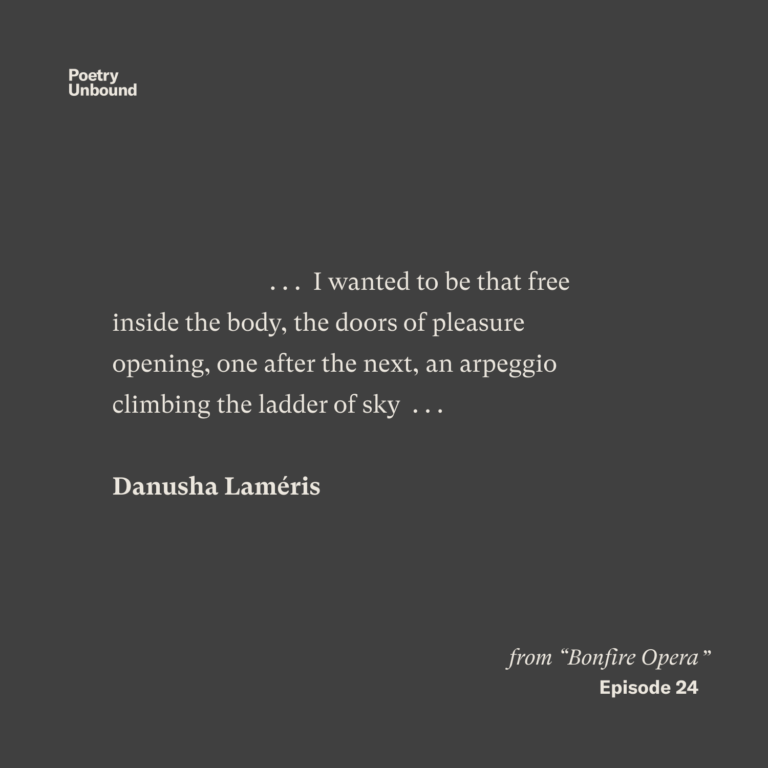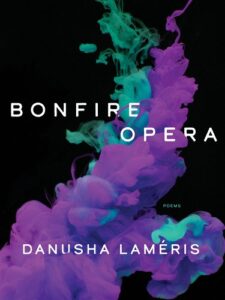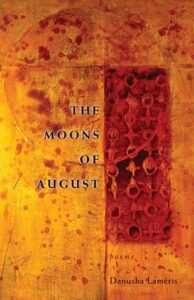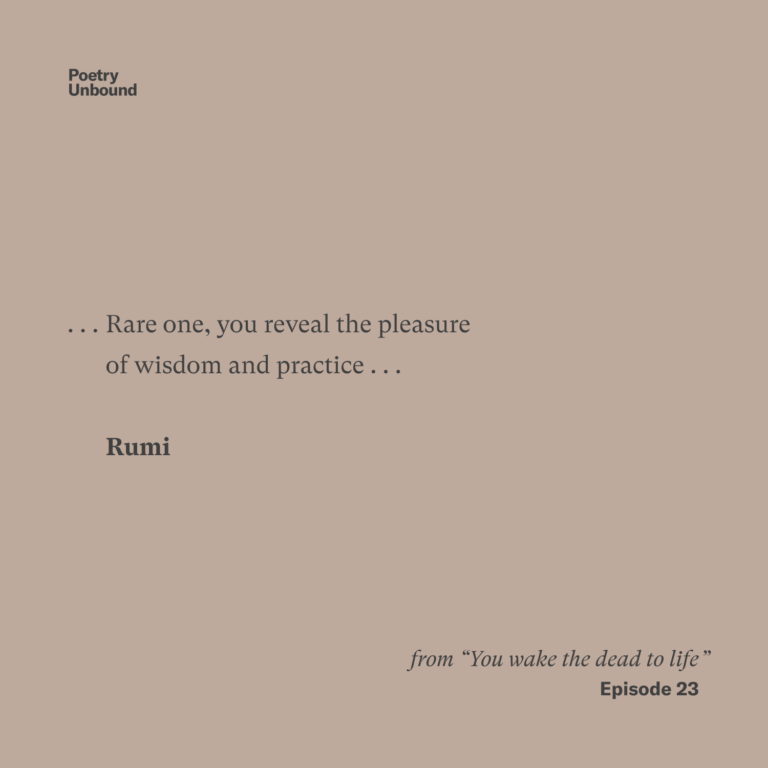Danusha Laméris
Bonfire Opera
A younger woman looks at an older woman, admiring her beauty, skill, and freedom. Older now, she thinks of how hard-won such freedom is.
Also: singing opera while taking off your clothes. That too.
We’re pleased to offer Danusha Laméris’ poem, and thank you for joining us for Season 6 of Poetry Unbound. We’ll be back with Season 7 later in 2023.
Order your copy of Poetry Unbound: 50 Poems to Open Your World and join us in our vibrant conversational space on Substack.

Guest

Danusha Laméris is a poet, teacher, and essayist. She is the author of The Moons of August (Autumn House, 2014), which was chosen by Naomi Shihab Nye as the winner of the Autumn House Press poetry prize, and was a finalist for the Milt Kessler Book Award. Her second book, Bonfire Opera (University of Pittsburgh Press, 2020), was a finalist for the Paterson Poetry Prize and winner of the Northern California Book Award in Poetry. The 2020 recipient of the Lucille Clifton Legacy Award, she is a Poet Laureate emeritus of Santa Cruz County, California. Image by Expressive Photographics.
Transcript
Pádraig Ó Tuama: Friends, thanks very much for listening to Poetry Unbound, whether you’re new or you’ve listened to them all — your attention makes everything worthwhile. I’ve got some news: I’ve written a book, Poetry Unbound: 50 Poems to Open Your World. There’s 50 poems, each with a fresh essay written by me. I’d love it if you’d buy it, or buy a few. And you can join up to our free interactive newsletter, as well. Links to everything at poetryunbound.org.
[music: “Praise the Rain” by Gautam Srikishan]
My name is Pádraig Ó Tuama and all my life, really, I’ve been kind of burdened by a profound sense of self consciousness about my body that has at times been really debilitating. And the older I’ve gotten, and also the more I read poetry and poetry’s attention to form, the more I realize that the body is form and that there are many questions to be asked about the form of the body, the most uninteresting of which are the ones that I have in terms of my own self-consciousness, but the most interesting of which are the ones about the nature of being human, the nature of changing, the nature of getting older, and being in a body alongside other people in bodies.
[music: “Praise the Rain” by Gautam Srikishan]
“Bonfire Opera” by Danusha Laméris.
“In those days, there was a woman in our circle
who was known, not only for her beauty,
but also for taking off all her clothes and singing opera.
And sure enough, as the night wore on and the stars
emerged to stare at their reflections on the sea,
and everyone had drunk a little wine,
she began to disrobe, loose her great bosom
and the tender belly, pale in the moonlight,
the Viking hips, and to let her torn raiment
fall to the sand as we looked up from the flames.
And then, a voice lifted into the dark, high and clear
as a flock of blackbirds. And everything was very still,
the way the congregation quiets when the priest
prays over the incense, and the smoke wafts
up into the rafters. I wanted to be that free
inside the body, the doors of pleasure
opening, one after the next, an arpeggio
climbing the ladder of sky. And all the while
she was singing and wading into the water
until it rose up to her waist and then lapped
at the underside of her breasts, and the aria
drifted over us, her soprano spare and sharp
in the night air. And even though I was young,
somehow, in that moment, I heard it,
the song inside the song, and I knew then
that this was not the hymn of promise
but the body’s bright wailing against its limits.
A bird caught in a cathedral—the way it tries
to escape by throwing itself, again and again,
against the stained glass.”
[music: “Creatures of Myth” by Gautam Srikishan]
So this poem, “Bonfire Opera” by Danusha Laméris, almost has four parts. It describes a woman who was a regular at certain parties who would, as a night wore on, disrobe and then sing opera. And then it describes it happening, we’re in the moment. And then we’re in the observational eye of a younger person who’s watching and reflecting on how it is that the freedom of this woman who’s singing and walking naked into the water, how it is that that’s meeting in her. “I wanted to be that free / inside the body”. And the final unexpected twist is hearing it isn’t only a song or an experience about being free in the body, that underneath it, that actually this dramatic, beautiful, powerful, skilled embodied demonstration of music is a demonstration of what it feels like to be constricted. And the beauty is mixed with a certain kind of tragedy.
The speaking voice in this poem ages. Because clearly this is a person remembering back into their past. “In those days,” the poem begins. And toward the end of it: “And even though I was young, / somehow, in that moment…”. This is a person who’s reflecting to say: I was younger. I’m not sure why it was that I could hear the pain inside the song, “the song inside the song.”
And these are the things that come with age, which is wisdom and capacity to live with regrets and recognition of the limitations. The kind of things that I thought I might have gotten over, but I’m still carrying with me and they have in themself become repositories, I hope, of wisdom, or the potential for wisdom.
And so what we have here are two moments in the life of the speaker of a poem, reflecting back in herself on a lesson that she heard young and has needed to grow into, which isn’t the lesson only of pleasure in the body: “an arpeggio / climbing the ladder of sky.” What a beautiful way to describe pleasures in the body. But it is also about recognizing the limitations of the body. Recognizing that this song was like “a bird in the cathedral” going up against the stained glass.
[music: “Creatures of Myth” by Gautam Srikishan]
Who is this woman who sings? We hear so much about her. She was known “not only for her beauty” – so she was beautiful. She was known for her singing voice and her presence at parties and her comfort with nakedness. And her voice then, “high and clear as a flock of blackbirds.” And the way that she could hold the moment of drama, of performance, of vulnerability. “[W]ading into the water”. It’s a gift that she gives to people at the party. And her song could suggest to the listeners that it wasn’t just a song of beauty. That also was something that we know about her – that she held within herself, the capacity to do something that was performative and also was demonstrating in that the layers held within the context of a performance. Perhaps something about the limitations of time, or the sadness of being alive, and the changing seasons that we go through in our life.
She’s compared, in the poem, to being like a priest: Everything was “still, / the way the congregation quiets when the priest / prays over the incense”. Here, we have a priest who was not garbed in vestments, but a priest who was garbed in her own body and using the sacrament of her voice, if you like, to offer something to everybody who’s present at this ritual, this party.
There’s a primal disquiet that is necessary in good ritual that is embodied in this poem. And this poem, I think, is perhaps offering us the fact that religion and art can, if they’re doing their work well, both enact something similar in us, which is to find a home in the restlessness and the shifting experience about what it means to be alive at different stages of your life.
[music: “Quarry Clouds” by Blue Dot Sessions]
As the speaker of the poem realizes that the song was not about the hymns “of promise / but the body’s bright wailing against its limits.” I find myself thinking: “where do I come up against my limitations?” I’m not talking about the ones you can overcome. You know, you can learn something or do something and kind of achieve something, but the ones you can’t. And what are the experiences of beauty and art that make me come alive there and can make the experience of limitation be alive with art and alive with tragedy, that inside a song of tragedy, there might be the possibility of joy and inside a song of joy and achievement, there might be the thread of melancholy. And that these are the things that feed each other and make art, art.
The image of the bird who was trying to escape the cathedral is “throwing itself, again and again, / against the stained glass.” That is an image of desperation. And it is an image of the capacity that the bird has to fly up there. If you think about where the stained glass is and that the bird is in the air, you see that it is the attempt, perhaps, which is where the art is made. And in that attempt, you see exhaustion and you see deep dedication, and you see the toll that it takes in this poor bird’s body. And you see the commitment that’s happening for the purpose of trying to get into that air that you think is calling you.
This is speaking about the existential limitation of being alive, which is that we know we cannot be everything and everywhere. We know that we are finite, even though we like to think about infinity. That is the kind of limitation that Danusha Laméris is speaking about here. And this bird, in the poem, will never get out of the cathedral, but yet it is making its own music and its own desperation in its body as it tries.
[music: “Ashed to Air” by Gautam Srikishan]
“Bonfire Opera” by Danusha Laméris.
“In those days, there was a woman in our circle
who was known, not only for her beauty,
but also for taking off all her clothes and singing opera.
And sure enough, as the night wore on and the stars
emerged to stare at their reflections on the sea,
and everyone had drunk a little wine,
she began to disrobe, loose her great bosom
and the tender belly, pale in the moonlight,
the Viking hips, and to let her torn raiment
fall to the sand as we looked up from the flames.
And then, a voice lifted into the dark, high and clear
as a flock of blackbirds. And everything was very still,
the way the congregation quiets when the priest
prays over the incense, and the smoke wafts
up into the rafters. I wanted to be that free
inside the body, the doors of pleasure
opening, one after the next, an arpeggio
climbing the ladder of sky. And all the while
she was singing and wading into the water
until it rose up to her waist and then lapped
at the underside of her breasts, and the aria
drifted over us, her soprano spare and sharp
in the night air. And even though I was young,
somehow, in that moment, I heard it,
the song inside the song, and I knew then
that this was not the hymn of promise
but the body’s bright wailing against its limits.
A bird caught in a cathedral—the way it tries
to escape by throwing itself, again and again,
against the stained glass.”
[music: “Praise the Rain” by Gautam Srikishan]
Chris Heagle: “Bonfire Opera” comes from Danusha Laméris’s book of the same title. Thank you to University of Pittsburgh Press who gave us permission to use Danusha’s poem. Read it on our website at onbeing.org.
[music: “Praise the Rain” by Gautam Srikishan]
Poetry Unbound is: Gautam Srikishan, Eddie Gonzalez, Lilian Vo, Lucas Johnson, Amy Chatelaine, Kayla Edwards, and me, Chris Heagle.
Our music is composed and provided by Gautam Srikishan and Blue Dot Sessions.
This podcast is produced by On Being Studios, which is located on Dakota land. Open your world to poetry with us by subscribing to our Substack newsletter at poetryunbound.org. You may also enjoy our other podcast On Being with Krista Tippett, or our newsletter, The Pause. Visit us at onbeing.org to find out more.
Books & Music
Recommended Reading
The On Being Project is an affiliate partner of Bookshop.org and Amazon.com. Any earnings we receive through these affiliate partnerships go into directly supporting The On Being Project.









